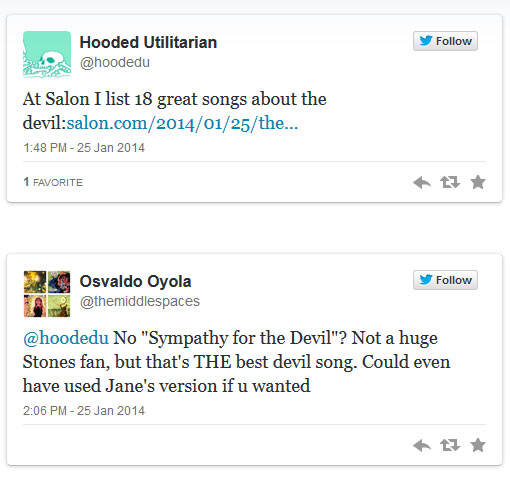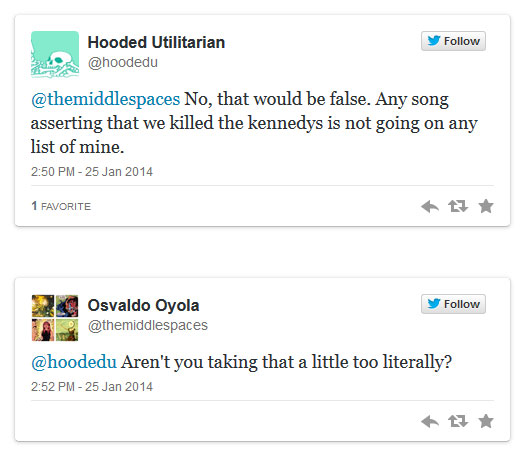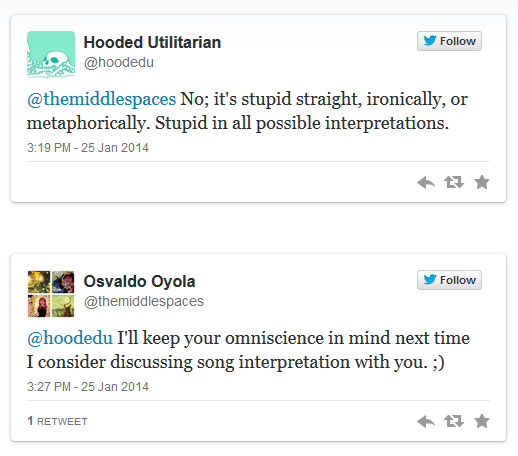Baudelaire may have said that “The finest trick of the devil is to persuade you that he does not exist,” but I think it is just the opposite. The finest trick humanity ever played was persuading itself that the devil was real.
Back in January, Noah Berlatsky posted a list of 18 songs about the devil over on Salon.com. After looking through the list I thought there were some overlooked gems. The most egregious was perhaps obvious, but as far as I’m concerned also the most worthy of inclusion: The Rolling Stones’ “Sympathy for the Devil.” I immediately tweeted at Noah (and I probably wasn’t the only one) about his oversight and we had the following exchange:
Now I can’t speak to why the allusion to the Kennedy killings is so objectionable to Noah (though I am sure he will come by the comments here and enlighten us—at least, I hope he will), but it did make me spend some time thinking about the song some more and what makes it so great.
It is probably deserves mentioning—as I did in my first tweet—I am no huge fan of the Stones. Generally speaking, I can take them or leave them. They have some great songs, no doubt, but I am not enamored of their white-boy blues-man pose, and find Keith Richards to be about as obnoxious a figure in rock n’ roll as there is (his comments on hip hop being particularly irksome). In the old Beatles or Stones binary, I am a Beatles guy. Despite this, I do have something of an obsession with “Sympathy for the Devil” and make it a point of collecting various covers of it. I love the live version by Jane’s Addiction (it takes Perry a while to warm up, but when he does his screech is haunting) and I even own Laibach’s Sympathy for the Devil EP on vinyl, which is nothing but really bizarre covers of the song. Heck, one of my first bands back in college, The Milk Lizards, used to do the song at our shows, so I’ve even sung it a bunch.
From the first lyric, the song does a great job operating in this tension between the personified and the historical. He personifies evil through his voicing of Lucifer, but as the examples of his evil deeds accumulate it becomes clear that every single one of his examples are evils for which human beings, not fallen angels, are responsible. Jesus Christ’s “moment of doubt and pain,” whether it is a reference to Gethsemane or his cry on cross, is his most human. The backing “whooo-whoo” gives the song the feel of a ritualistic chant while questioning the assertions of the singer. Who? Who? Who really is responsible for the events he lists? Who is the devil and what purpose does the idea of a devil even serve? Isn’t he just a convenient excuse for humanity’s corruption, short-sightedness, greed, selfishness and capricious penchant for violence? Doesn’t belief in the devil and his evil implicitly legitimize a network of institutions that put God at their head in opposition to this evil, but actually perpetuate the wars, massacres and murders being enumerated in the song’s lyrics—“kings and queens who fought for 10 decades for the gods they made”?
The idea of making gods is actually quite important to the theme of the song, because while the song claims the name we should be guessing is “Lucifer,” its speaker doesn’t say “I am Lucifer” or “My name is Lucifer,” but rather “Call me Lucifer.” In other words, the name we guess should be our own, but we made up Lucifer instead. Isn’t that the puzzle mentioned in song’s refrain? The inability to turn our gaze upon ourselves, our own institutions for the pain and evil in the world?
Sure, that “our” might be problematic. What do I have to do with “the Blitzkrieg rage” or the overturning of Czars (a thing that I’d argue needed to happen, but nevertheless led to decades more corruption and suffering)? But at the same time, the “I” in the song is metaphorical. It is any “I” informed by ideology or bound by duty to do things like driving a tank into France or going into the Ambassador Hotel to put a few bullets in Bobby Kennedy’s head and back.
Which brings me back to Noah’s objection, which still strikes me as too literal-minded. Our discussion about that one line—“I shouted out, ‘Who Killed the Kennedys?” When after all, it was you and me”—made me think of Ladybird Johnson’s journal entry on the assassination of JFK, and her report on Jackie Kennedy’s response when asked if she wanted to change out of her “dress…stained with blood. One leg was almost entirely covered with it and her right glove was caked, it was caked with blood – her husband’s blood.” Jackie replied “with almost an element of fierceness – if a person that gentle, that dignified, can be said to have such a quality – she said, ‘I want them to see what they have done to Jack.’” Who was this “them” she referring to? Based on the timeline of the day of the assassination this was after Oswald had already been captured, so the use of the plural is weird. I am not trying to plead a case for Kennedy assassination conspiracies, because as fishy as everything surrounding it may be, the ability for 50 years to pass without even one conspirator coming forth or someone in the know providing evidence makes it increasingly likely that Oswald did act alone—no secret can be kept that well for that long. No, I just mean that her accusation resonates with the Stones’ lyric, even if the anguish of the recently widowed undermines the ability to interpret the specificity of her statement in any kind of definitive manner.
Regardless what she might have meant or not meant, I think of Jackie’s exclamation as referring to everyone. You and me. The fact that Jackie probably bought the whole Cold War ideological narrative just reinforces this notion, since she probably felt she lost her husband due to his efforts to protect the little people from the big bad Russians, Cubans and Communists. In other words, “they” were the American people. Who else would feel guilty? Not his actual assassins. Why would they care? Why wouldn’t they feel glee to see Kennedy’s blood on her dress?
I am not making the claim that Jagger and Richards were making a reference to this in their song, but rather the notion that there are broader implication for political assassinations already present in terms of the systems of belief that support those kinds of actions and their global consequences. The whole “Camelot” pretension is bullshit. Americans were outraged at their leader being killed as their leaders worked to kill others. “We” put them there to do that. Evil is what men do. If Malcolm X was right that Kennedy’s killing was “chickens coming home to roost,” then “Sympathy for the Devil” with its Afro-Latin sounds was an attempt to sacrifice one of those chickens and cast some protective blessing or ritualistic warning through pop music.
And sonically, the song delivers just that. It’s fantastic. It feels kind of raw and loose. Not only the ragged “Who-Who” chant, but the halting jagged pecking guitar solo and Jagger’s many affected exclamations of “yeah” introduced with their uncertain “um.” Along with his grunts and cries, it gives the song an uneasiness. The song is frenetic. It builds to a desperate feel without actually getting any faster, cohering around the piano chord changes and the bubbling bass. And yes, the choice of the conga drums, shakers, and the samba rhythm give it that kind of worrisome “voo-doo” feel. I think it was meant to sound primitive and dark to white ears in 1968, but I give it a conditional pass because it works. Jagger sings with a fantastic coaxing menace that matches, if not surpasses, any other performance of the role of the devil—barely contained, but somehow civilized, in way that tanks and kings are signs of civilization. “Sympathy for the Devil” gives us the realest and most affecting devil in pop music, but giving us something to really be scared of—ourselves.
And thus, that’s why if you meet the devil you should “have some courtesy, some sympathy and some taste some taste / Use all your well-learned politesse” because you are meeting the devil every day, and a little sympathy, compassion and politeness can go a long way avoiding the kind of denial of humanity, lack of empathy, that perpetuates evil and makes us all potential devils.




